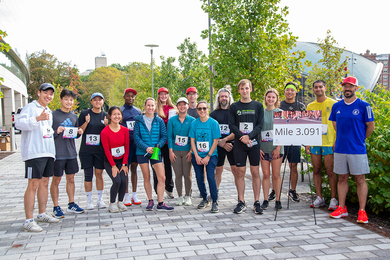The Nobel Prize Committee awarded a share of the 2019 Nobel Prize in Chemistry to John Bannister Goodenough for the development of the lithium-ion battery, which is used widely in portable electronics and which the committee stated has "enabled the mobile world." Goodenough, currently a professor at the University of Texas at Austin, began his engineering career in 1952 at MIT Lincoln Laboratory, where he worked on random access memory for computers used by the Laboratory-developed SAGE air defense system.
Goodenough's career at Lincoln Laboratory spanned 24 years, ending with his move in 1976 to become a professor of inorganic chemistry at Oxford University in the U.K. During his tenure at the Laboratory, Goodenough was a technical staff member and then a leader in several groups, overseeing pioneering work on computing and conducting seminal research on the magnetic and electrical properties of materials. In 1958, he was promoted to associate leader of the Digital Computer Development Group. A year later, he moved to the Computer Components Group as its leader. He became the leader of the Magnetism and Resonance Group in 1963 and transferred to the Electronic Materials Group as its leader in 1965.
During his time at Lincoln Laboratory, Goodenough garnered honors for his contributions to science and engineering. In 1963, he was elevated to Fellow of the American Physical Society. In 1967, he was named a Docteur Honoris Causa of the University of Bordeaux for his interdisciplinary work in physics. The National Academy of Engineering elected Goodenough to membership in 1976, recognizing his work on designing materials for electronic components and his elucidation of the relationships between properties, structures, and chemistry. Also in 1976, he was invited by the Chemical Society to deliver a Centenary Lecture at seven universities in England and Scotland; this Centenary Lectureship, an honorary appointment, was offered to Goodenough for his contributions to solid-state chemistry.
Goodenough shares this Nobel Prize with researchers M. Stanley Whittingham of Binghamton University, a state university in New York, and Akira Yoshino of Meijo University in Japan. He will receive the prize in December.







